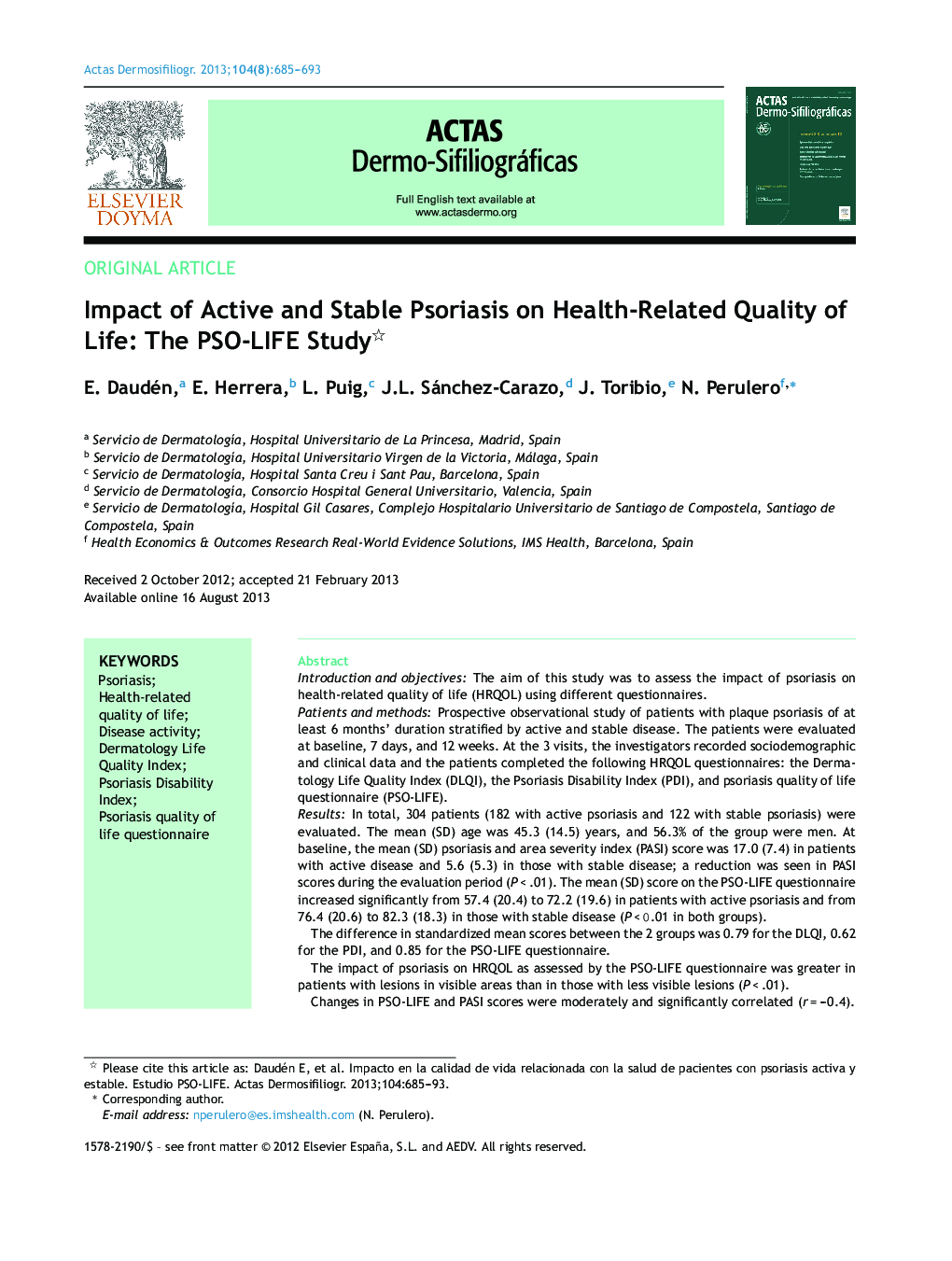| Article ID | Journal | Published Year | Pages | File Type |
|---|---|---|---|---|
| 3182225 | Actas Dermo-Sifiliográficas (English Edition) | 2013 | 9 Pages |
Introduction and objectivesThe aim of this study was to assess the impact of psoriasis on health-related quality of life (HRQOL) using different questionnaires.Patients and methodsProspective observational study of patients with plaque psoriasis of at least 6 months’ duration stratified by active and stable disease. The patients were evaluated at baseline, 7 days, and 12 weeks. At the 3 visits, the investigators recorded sociodemographic and clinical data and the patients completed the following HRQOL questionnaires: the Dermatology Life Quality Index (DLQI), the Psoriasis Disability Index (PDI), and psoriasis quality of life questionnaire (PSO-LIFE).ResultsIn total, 304 patients (182 with active psoriasis and 122 with stable psoriasis) were evaluated. The mean (SD) age was 45.3 (14.5) years, and 56.3% of the group were men. At baseline, the mean (SD) psoriasis and area severity index (PASI) score was 17.0 (7.4) in patients with active disease and 5.6 (5.3) in those with stable disease; a reduction was seen in PASI scores during the evaluation period (P < .01). The mean (SD) score on the PSO-LIFE questionnaire increased significantly from 57.4 (20.4) to 72.2 (19.6) in patients with active psoriasis and from 76.4 (20.6) to 82.3 (18.3) in those with stable disease (P < 0.01 in both groups).The difference in standardized mean scores between the 2 groups was 0.79 for the DLQI, 0.62 for the PDI, and 0.85 for the PSO-LIFE questionnaire.The impact of psoriasis on HRQOL as assessed by the PSO-LIFE questionnaire was greater in patients with lesions in visible areas than in those with less visible lesions (P < .01).Changes in PSO-LIFE and PASI scores were moderately and significantly correlated (r = –0.4).ConclusionsThe impact of psoriasis on HRQOL is higher in patients with active disease. The PSO-LIFE questionnaire showed a greater tendency to discriminate between active and stable psoriasis than either the DLQI or the PDI. PSO-LIFE scores correlated significantly with lesion site and disease severity as measured by PASI.
ResumenIntroducción y objetivosEl objetivo del estudio fue valorar el impacto de la psoriasis en la cali-dad de vida relacionada con la salud (CVRS) mediante diferentes cuestionarios de evaluación.Pacientes y métodosEstudio observacional prospectivo en pacientes con psoriasis en placas de más de 6 meses de evolución, estratificándose en psoriasis activa (PsoA) y psoriasis estable (PsoE). Se realizó visita basal a los 7 días y al final (12 semanas). En cada una se recogieron características sociodemográficas y clínicas y cuestionarios de CVRS: Dermatology Life Quality Index (DLQI), Psoriasis Disability Index (PDI) y cuestionario de calidad de vida en psoriasis (PSO-LIFE).ResultadosSe evaluaron 304 pacientes: 182 con PsoA y 122 con PsoE. La edad media (DE) fue 45,3 (14,5) años y el 56,3% eran hombres. La puntuación media (DE) basal del PASI en PsoA fue 17,0 (7,4) y en PsoE fue 5,6 (5,3), disminuyendo durante el estudio (p < 0,01). La puntuación media (DE) del cuestionario PSO-LIFE aumentó de 57,4 (20,4) a 72,2 (19,6) en PsoA y de 76,4 (20,6) a 82,3 (18,3) en PsoE (p < 0,01 ambos).Las diferencias de las puntuaciones medias estandarizadas entre los 2 grupos fueron: 0,79 para el DLQI, 0,62 para el PDI y 0,85 para el PSO-LIFE.Los pacientes con lesiones en las zonas visibles tuvieron una mayor afectación según el cuestionario PSO-LIFE que los pacientes con afectación en zonas no tan visibles (p < 0,01).Los cambios en la puntuación del PSO-LIFE y los cambios en el PASI mostraron una correlación moderada (r = -0,4) y estadísticamente significativa.ConclusionesLos pacientes con PsoA presentan una mayor afectación de la CVRS. El cuestionario PSO-LIFE mostró una mayor tendencia para discriminar entre ambos grupos de pacientes (PsoA y PsoE) que el DLQI y PDI. La localización de las lesiones y la gravedad, según el PASI, se correlacionaron de forma significativa con las puntuaciones del cuestionario PSO-LIFE.
